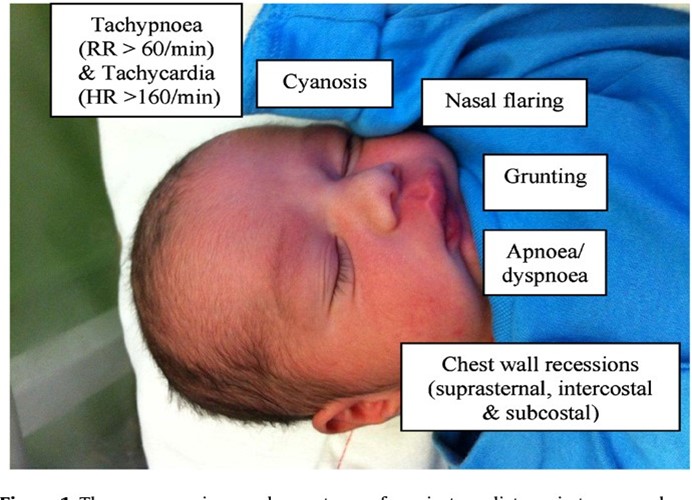To prevent possible retinopathy in a preterm infant requiring oxygen therapy, the nurse will:
Keep the infant's eyes covered at all times.
Position with the head slightly lower than the body.
Administer low concentrations of oxygen.
Monitor arterial oxygen levels with a pulse oximeter.
The Correct Answer is C
Administer low concentrations of oxygen. Retinopathy of prematurity (ROP) is a disease of retinal vascular and capillary proliferation affecting premature infants undergoing oxygen therapy. Oxygen treatment results in pathologic growth of vessels in the developing retina that may lead to permanent damage to the retina as well as retinal detachment and macular folds. Administering low concentrations of oxygen can help prevent ROP by reducing the oxygen-induced vasoconstriction and vascular endothelial growth factor (VEGF) expression.
Choice A is not correct because keeping the infant's eyes covered at all times does not prevent ROP. In fact, it may increase the risk of infection or injury to the eyes.
Choice B is not correct because positioning with the head slightly lower than the body does not prevent ROP. It may increase the intracranial pressure and affect the cerebral blood flow.
Choice D is not correct because monitoring arterial oxygen levels with a pulse oximeter does not prevent ROP. It is a useful tool to guide oxygen therapy, but it does not directly affect retinal vascular development.
Nursing Test Bank
Naxlex Comprehensive Predictor Exams
Related Questions
Correct Answer is B
Explanation
Fundus firm, at the level of the umbilicus. This is because the normal postpartum uterine fundus location should be around the belly button (umbilicus) one hour after delivery and then decrease by 1 cm per 24 hours. A firm fundus indicates that the uterus is contracting well and preventing bleeding.

Choice A is wrong because a soft fundus indicates uterine atony, which is a risk factor for hemorrhage.
Choice C is wrong because the fundus should not be above the umbilicus 12 hours after delivery.
Choice D is wrong because a fundus to the right of the umbilicus indicates a full bladder, which can displace the uterus and cause bleeding.
Correct Answer is D
Explanation
Sternal or chest retractions. This is because sternal or chest retractions are a sign of respiratory distress in newborns, which means they are having difficulty breathing. Chest retractions occur when the baby's chest pulls in with each breath, indicating that they are using extra muscles to breathe. This can be caused by various conditions that affect the lungs, such as respiratory distress syndrome (RDS), transient tachypnea of the newborn (TTN), meconium aspiration syndrome (MAS), pneumonia, or congenital heart defects.
 Choice A is not correct because mucus draining from the nose is not a symptom of respiratory distress in newborns. It is normal for newborns to have some mucus in their nose and mouth after birth, which can be cleared by suctioning or wiping.
Choice A is not correct because mucus draining from the nose is not a symptom of respiratory distress in newborns. It is normal for newborns to have some mucus in their nose and mouth after birth, which can be cleared by suctioning or wiping.
Mucus drainage does not interfere with breathing unless it is excessive or thick.
Choice B is not correct because cyanosis of the hands and feet is not a symptom of respiratory distress in newborns. It is normal for newborns to have bluish discoloration of their hands and feet, called acrocyanosis, for the first few days after birth. This is due to immature circulation and does not indicate a lack of oxygen. Cyanosis of the central parts of the body, such as the face, lips, and tongue, is more concerning and should be reported.
Choice C is not correct because irregular heart rate is not a symptom of respiratory distress in newborns. It is normal for newborns to have some variations in their heart rate, especially during sleep cycles. The normal heart rate range for newborns is 100 to 160 beats per minute. A heart rate that is too fast (tachycardia) or too slow (bradycardia) may indicate a problem with the heart or other organs³.
Whether you are a student looking to ace your exams or a practicing nurse seeking to enhance your expertise , our nursing education contents will empower you with the confidence and competence to make a difference in the lives of patients and become a respected leader in the healthcare field.
Visit Naxlex, invest in your future and unlock endless possibilities with our unparalleled nursing education contents today
Report Wrong Answer on the Current Question
Do you disagree with the answer? If yes, what is your expected answer? Explain.
Kindly be descriptive with the issue you are facing.
